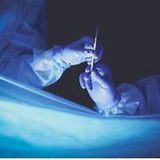
Q. A 42-year-old woman presents to her physician with generalized itching. Physical examination reveals scleral icterus. Laboratory tests show: Total bilirubin: 2.7 mg/dL Conjugated bilirubin: 2.4 mg/dL Alkaline phosphatase: 253 U/L Aspartate aminotransferase: 36 U/L Alanine aminotransferase: 40 U/L What is the most likely mechanism underlying this patient’s jaundice? (A) Absence of UDP-glucuronyl transferase (B) Decreased levels of UDP-glucuronyl transferase (C) Extravascular destruction of the patient’s RBCs (D) Intrahepatic or extrahepatic biliary obstruction (E) Intravascular destruction of the patient’s RBCs
The correct answer is D. This patient has obstructive jaundice, causing her pruritus and scleral icterus. In this situation conjugated bilirubin cannot be excreted, and its levels are therefore elevated in the serum. The unconjugated bilirubin level, however, is not elevated. Alkaline phosphatase is usually elevated in cases of obstructive jaundice. Answer A is incorrect. This is seen in CriglerNajjar syndrome type I, which leads to kernicterus and is diagnosed during childhood. Extremely high levels of unconjugated bilirubin would be expected in this case. Answer B is incorrect. This is seen in Gilbert’s syndrome, which does not have any clinical consequence. This syndrome is more common in men, the jaundice is typically associated with stress or exercise, and alkaline phosphatase levels are normal. Answer C is incorrect. Extravascular hemolysis would lead to increased levels of unconjugated bilirubin. Hemoglobinuria would not be observed in these patients. Answer E is incorrect. Intravascular hemolysis would lead to an increase in unconjugated bilirubin, which is not the case in this patient. Also, levels of alkaline phosphatase would not be elevated in a patient with increased RBC destruction. Hemoglobinuria would be expected in these patients.



